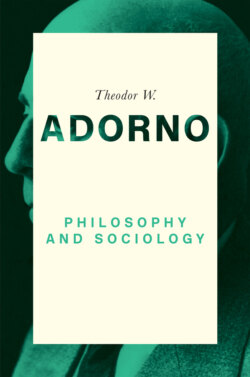Читать книгу Philosophy and Sociology: 1960 - Theodor W. Adorno - Страница 5
Overview
ОглавлениеLECTURE
Are philosophy and sociology mutually incompatible? – Controversy with König and Schelsky (I) – Kant’s influence on phenomenology and ontology – The origins of sociology in Saint-Simon – Psychology in Kant – Against ‘purity’
LECTURE 2
Resistance to philosophy on the part of sociology – Comte’s ‘law of the three stages’ (I) – The origins of sociology in France – Order and progress in Comte – The claim to priority on the part of sociology – Freedom of conscience and national sovereignty – Comte’s conception of institutions – Driven towards dialectics – The concept of positivism – First nature and second nature – Political content of Comte’s argument
LECTURE 3
Social Darwinism – Emphasis on subjectivity – Demand for systematic immanence in thought – The question of the utility of science – ‘Sociological schizophrenia’ – Priority of the social system (I) – Social compulsion – Sociology and philosophy as a dynamic unity
LECTURE 4
Comte’s demotion of philosophy – The appeal of positivism – Comte’s nominalism – ‘The law of three stages’ (II) – The pretensions of speculative thought – Controversy with König and Schelsky (II) – Against the demand for intelligibility – Ordinary language and logic
LECTURE 5
‘Chosisme’ (I) – Sociology addresses the constituted – Durkheim’s critique of ‘Ideas’ in Comte – Durkheim’s critique of Comte’s concept of progress (I) – Durkheim’s critique of Comte’s ‘law of the three stages’ – ‘Collective spirit’ as explanation of social phenomena – ‘Chosisme’ (II) – Reification of society
LECTURE 6
Concepts and observation – Critical generosity – The category of ‘meaning’ – Priority of the social system (II) – ‘Chosisme’ (III) – The concept of ‘understanding’ – Theory of the unintelligible
LECTURE 7
Objective tendency – Mediation between social and individual domains – ‘Chosisme’ (IV) – Durkheim’s critique of Comte’s concept of progress (II) – The dialectic of progress – The violence of progress – The irrationality of rationality – Different modes of mediation in philosophy and sociology
LECTURE 8
A pause in the argument – Concepts of ‘philosophy’ and ‘sociology’ operating at different levels – ‘Hyphen-sociologies’ – Sociology as a recent discipline – Sociology and empirical social research – Max Weber’s definition of sociology – Philosophy and facticity – The provincial situation of Germany
LECTURE 9
Transition to the theory of ideology – Space and time in Durkheim – On the mediation of mind and society – Concept of truth – The conceptual moment in exchange – The ‘natural character’ of the productive process is illusory – Concept of ideology presupposes an understanding of totality – Theory of ideology is philosophical rather than sociological
LECTURE 10
Truth not presentable in isolated theses – Historical development of the concept of ideology (I) – Forces of production and relations of production – Problems of constitution as social problems – Subjectivity in positivism (I) – Difference between Kant and Hume – Subjectivity in positivism (II) – Atomistic character of statistics – Relationship between truth and consciousness – Analysis of motivation
LECTURE 11
Theory of ideology behind the controversy between philosophy and sociology – Historical character of the mind – On the concept of total ideology – Against the all-encompassing suspicion of ideology – Danger of apologetic thought – Changing function of theories of ideologies (I)
LECTURE 12
Changing function of theories of ideology (II) – Slower transformation in the superstructure; ‘cultural lag’ – Apologetic tendencies of civil society – The truth moment of empirical sociology – Organized science and the independence of thought – The possibility of a theory of contemporary society (I) – The irrational character of capitalist society
LECTURE 13
The possibility of a theory of contemporary society (II) – Nominalism incompatible with theory formation – ‘Political distribution’ instead of market society – Social ‘cement’ – ‘Diamat’ – Dialectic not a method – Demand for intellectual freedom
LECTURE 14
Historical development of the concept of ideology (II) – Bacon’s theory of idols – Critique of language – Theory of ideology not a psychology of ‘interests’ – The primal history of modernity – Making a fetish of history – More ideology or less
LECTURE 15
The dissolution of ideologies (I) – Technologies and mass media – Class consciousness – The ‘sceptical generation’ and technological illusion – Scepticism as an attitude (I)
LECTURE 16
Scepticism as an attitude (II) – Different kinds of ideology – Legitimating ideologies – Complementary ideologies – Meaninglessness as meaning – Controversy with Benjamin – Danger of oversimplifying the concept of ideology (I) – Danger of oversimplifying the concept of ideology (II)
LECTURE 17
Theoretical typologies in the social sciences – The ideology of concealment – Concepts created through their extremes – The dissolution of ideologies (II) – Priority of the genetic moment in the concept of ideology – Against the dichotomy of genesis and validity – On mediation – Truth as historical (I); the history in truth – Truth as historical (II); the genetic implications for meaning
LECTURE 18
Against Mannheim’s account of genesis and validity – the genetic aspect of the mind as critical aspect – Against the idea that ‘what has come to be’ cannot be true – Example: logic in the development of music – Historical mediation of Plato and Aristotle
